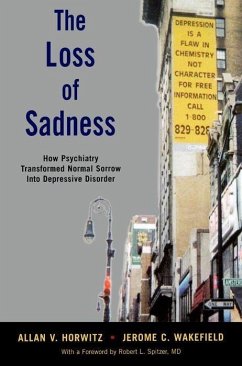
Feeling Good
The Science of Well-Being

PAYBACK Punkte
40 °P sammeln!
The separation of biomedical and psychosocial approaches to mental illness has hampered both research and treatment because only a fully integrated view of life permits a person to develop wisdom and well-being. In this long-awaited work, psychiatrist Robert Cloninger argues that all persons have spontaneous needs for happiness, self-understanding, and love, and he describes a way toward achieving psychological coherence that satisfies these basic human needs. The novel synthesis
that he provides is based on the latest findings and concepts in neuroscience, genetics, long-term biopsychosocial research, and complex networks, combined with a reliable, quantitative way of measuring human thought, social relationships, and creativity.
that he provides is based on the latest findings and concepts in neuroscience, genetics, long-term biopsychosocial research, and complex networks, combined with a reliable, quantitative way of measuring human thought, social relationships, and creativity.
All human beings have spontaneous needs for happiness, self-understanding and love. In Feeling Good: The Science of Well Being, psychiatrist Robert Cloninger describes a way to coherent living that satisfies these strong basic needs through growth in the uniquely human gift of self-awareness. The scientific findings that led Dr Cloninger to expand his own views in a stepwise manner during 30 years of research and clinical experience are clearly presented so that readers
can consider the validity of his viewpoint for themselves. The principles of well-being are based on a non-reductive scientific paradigm that integrates findings from all the biomedical and psychosocial sciences. Reliable methods are described for measuring human thought and social relationships at each step
along the path of self-aware consciousness. Practical mental exercises for stimulating the growth of self-awareness are also provided. The methods are supported by data from brain imaging, genetics of personality, and longitudinal biopsychosocial studies.
Feeling Good: The Science of Well-Being will be of value to anyone involved in the sciences of the mind or the treatment of mental disorders. It will also interest theologians, philosophers, social scientists, and lay readers because it provides contemporary scientific concepts and language for addressing the perennial human questions about being, knowledge, and conduct.
can consider the validity of his viewpoint for themselves. The principles of well-being are based on a non-reductive scientific paradigm that integrates findings from all the biomedical and psychosocial sciences. Reliable methods are described for measuring human thought and social relationships at each step
along the path of self-aware consciousness. Practical mental exercises for stimulating the growth of self-awareness are also provided. The methods are supported by data from brain imaging, genetics of personality, and longitudinal biopsychosocial studies.
Feeling Good: The Science of Well-Being will be of value to anyone involved in the sciences of the mind or the treatment of mental disorders. It will also interest theologians, philosophers, social scientists, and lay readers because it provides contemporary scientific concepts and language for addressing the perennial human questions about being, knowledge, and conduct.













